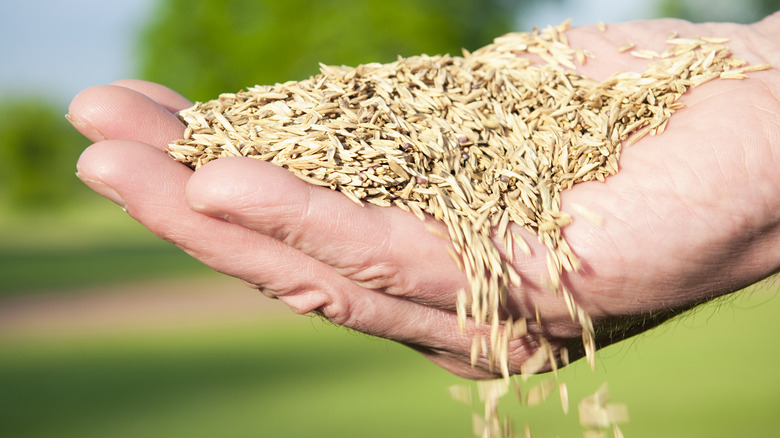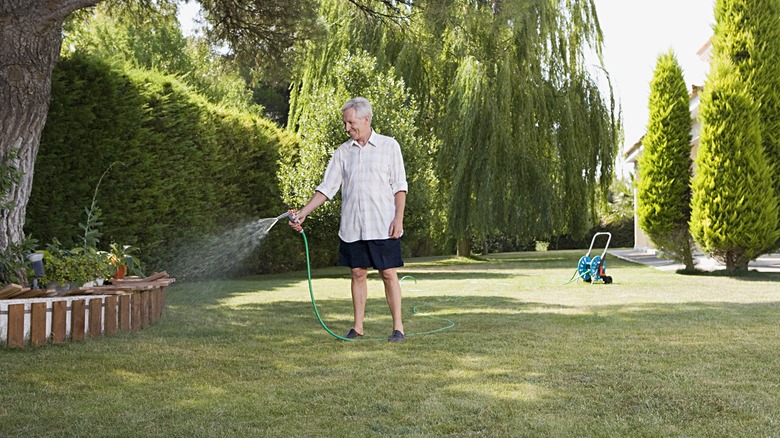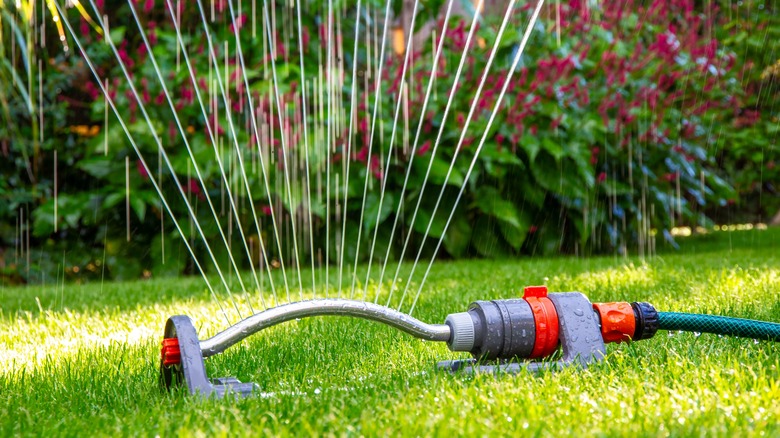Our Lawncare Expert's Top Watering Tips For Growing Grass From Seed In Warm Weather
Seeding a lawn tends to require a lower upfront cost than sod, can be easily done by the homeowner themselves, and once established, can also lead to healthier grass. Warm-season grass seeds tend to fare best in hot climates or planted in late spring and early summer, but the weather can have a mind of its own, scorching your poor seeds if you're not careful. When starting a lawn grass seed lawn in the heat, sometimes it's best to turn to the experts for advice. In an exclusive interview with House Digest, Ryan Farley, CEO at LawnStarter, shared helpful tips for what you should know about seeding your lawn in hot weather, and it all boils down to water. Farley advises that you water your grass seeds frequently, consistently, and appropriately for the weather, while avoiding a few crucial mistakes.
Of course, sometimes this is all a little easier said than done. If you find yourself planting seeds during an especially hot time of year, you may face some extra challenges, but it's not impossible to grow grass seeds in hot weather. Here are Farley's expert tips to defy the odds of nature and enjoy an expert-level lawn in no time.
Don't let your lawn dry out
Kicking off his exclusive interview with House Digest, Ryan Farley's first tip is a straightforward one: "Water, water, water! Making sure your grass seed gets enough water is key to helping it germinate and grow effectively." During the peak of summer or in extremely hot climates, the seeds must remain consistently moist. If the young seeds are allowed to dry out, they could fail to split and grow or die quickly after germinating. "It's best to water your grass a few times a day, usually for short stretches," says Farley, "The goal is to keep the grass wet without washing it out." The amount of watering could also depend on your grass species and how long it typically takes for the grass seed to grow. "Tall fescue is notorious for needing extra water, especially when you're starting it from seeds."
However, that doesn't mean you should always water your grass on a strict schedule. Farley warns, "It's essential to keep the weather in mind. Precipitation and even high humidity will reduce your need to water." While he reminds readers that full sun is important to grow grass effectively, too much sunlight can also cause problems, especially when humidity is low. "[The sun] can quickly dry out the ground on hot, dry, sunny days," says Farley "Humidity plays a bigger role than temperature. A dry, sunny 70-degree day can dry out your lawn much faster than a humid 90-degree day."
Keep lawncare controlled and consistent
Underwatering may be the most obvious concern, but in his exclusive interview with House Digest, Ryan Farley also cautioned prospective lawn owners on a few other crucial mistakes, the first of which may be surprising. "Overwatering. I know, I just got done telling you how important watering is, but too much water can be just as bad as too little," warns Farley, adding, "Even if you're watering in the right amounts, using a bare hose or especially splashy sprinkler can wash away grass seed, leading to bare patches." Farley also warns against uneven watering, saying, "It's essential to water every square foot of your new lawn. This may mean moving a sprinkler around throughout the day or setting up multiple sprinklers or drip lines for best results."
Besides diligent watering practices, there are a few other ways to support your new lawn and help it thrive despite the hot weather, like understanding how long after planting grass seed you should wait to mow. This can vary by grass species, but in general, you should avoid extensively grooming your lawn until the grass is strong enough to withstand that trauma — usually after about four to six weeks. But this doesn't mean you should let it all go wild. "Watch for weeds," advises Farley, "Warm weather is great for plant growth — all plant growth. Opportunistic weeds can often move in thanks to the optimal growing conditions you're creating."


